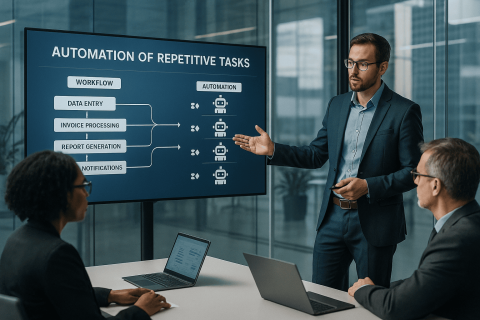Micro-Task Automation Consulting: The New Frontier of Business Efficiency
The micro-task automation consulting field has experienced remarkable growth — and for good reason. Businesses across industries are recognizing that small, repetitive tasks consume far more resources than they should. What's fascinating is how this mirrors risk assessment in other sectors; just as platforms like 1xbet casino calculate odds and probabilities, automation consultants analyze workflow patterns to predict efficiency gains.
I've observed that companies often underestimate the cumulative impact of minor inefficiencies. A five-minute daily task might seem insignificant, but when multiplied across teams and months, it represents substantial opportunity costs. This is where specialized consultants step in, offering expertise that most internal teams simply don't possess.
Identifying Automation Opportunities Through Data Analysis
The foundation of effective automation consulting lies in meticulous process mapping. Workflow optimization techniques reveal patterns that aren't immediately obvious to internal stakeholders. Nevertheless, the most successful consultants I've encountered don't just collect data — they interpret it within the context of broader business objectives.
Key areas where micro-task automation delivers measurable results:
- Data entry and customer relationship management systems integration
- Invoice processing and accounts payable workflow optimization
- Email sorting and response templates for customer service teams
- Social media content scheduling and engagement tracking systems
- Inventory management alerts and reorder point calculations
The ROI on these improvements can be substantial. Recent studies indicate that businesses implementing targeted micro-task automation see productivity increases of 25-40% in affected departments. More importantly, employee satisfaction often improves when staff can focus on strategic work rather than repetitive tasks.
Building Performance-Based Consulting Models
What sets top automation consultants apart is their willingness to tie compensation to results. This approach creates alignment between consultant and client — both parties benefit when automation delivers promised improvements. Performance metrics in automation consulting demonstrates how measurable outcomes drive successful partnerships.
Some consultants are even experimenting with what might be called "efficiency milestone betting" — wagering their fees on achieving specific productivity targets. This isn't gambling in the traditional sense, but rather a confidence-based pricing model that reflects genuine expertise. When consultants are willing to stake their compensation on results, clients gain additional assurance about projected outcomes.
The psychology here is interesting. By accepting performance-based compensation, consultants signal their confidence while clients feel more secure about their investment. This alignment of interests often leads to better outcomes for both parties.
Technology Integration and Change Management
Successful automation implementation requires more than just identifying inefficient processes. The human element — helping teams adapt to new workflows — often determines whether automation initiatives succeed or fail. Change resistance is natural, and I've seen promising automation projects stumble when this factor isn't adequately addressed.
Modern automation tools have become remarkably sophisticated. Cloud-based platforms now offer integration capabilities that were previously available only to large enterprises. Small and medium businesses can implement automation solutions that would have required significant IT infrastructure just a few years ago.
The consulting opportunity here extends beyond initial implementation. Ongoing optimization, troubleshooting, and scaling represent substantial revenue streams for consultants who position themselves as long-term partners rather than one-time solution providers.
Training becomes another revenue opportunity. Teams need guidance on maximizing automation benefits, and this education component often proves as valuable as the initial setup. Consultants who understand adult learning principles and change management psychology tend to achieve better client outcomes.
What's particularly compelling about this field is its scalability. A consultant can develop standardized methodologies while customizing solutions for specific industries or company sizes. Templates, checklists, and proven processes become reusable assets that improve project margins over time.
The future looks bright for automation consulting. As businesses become more data-driven and efficiency-focused, demand for specialized expertise continues growing. Companies that might have handled process improvement internally are now recognizing the value of outside perspective and specialized knowledge.
This trend reflects broader changes in how businesses approach operational efficiency. Rather than viewing automation as a one-time project, forward-thinking companies are embracing continuous improvement philosophies where ongoing optimization becomes part of their competitive strategy.
